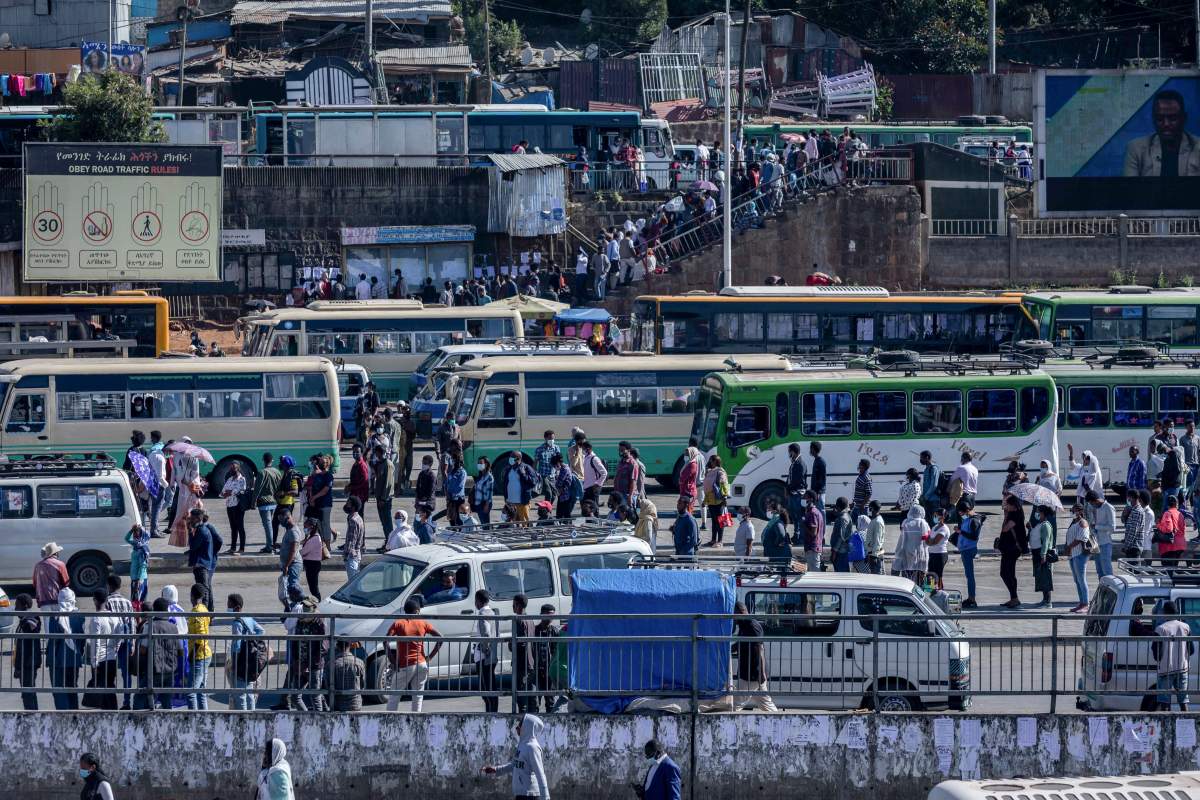Ethiopia’s deadly conflict with its northern Tigray region spilled over borders Tuesday as several thousand people fled into Sudan, while the Tigray regional leader accused Eritrea of attacking at the request of Ethiopia’s federal government.

The government of Ethiopia’s Nobel Peace Prize-winning Prime Minister Abiy Ahmed appeared to reject international pleas for dialogue, instead seeking to use force to arrest the leaders of a regional government it regards as illegal and destroy its well-stocked arsenal. Even as the African Union urged an immediate cease-fire, Abiy again vowed the military would bring a speedy end to the fighting.
The flow of refugees was the first visible sign of a growing humanitarian crisis affecting millions of people. Tigray remains almost completely cut off from the world nearly a week after communications were severed and Abiy announced a military offensive in response to an alleged attack on a military base.
Hundreds of people have been reported killed on both sides of the conflict so far, one diplomat said.
The British foreign secretary, Dominic Raab, tweeted that he spoke with Abiy on Tuesday and “called for de-escalation of the Tigray conflict — civilians and humanitarian access must be protected.”
The head of the refugee agency in Sudan’s Kassala province, Al-Sir Khalid, told The Associated Press they had received at least 3,500 refugees including women and children. Others were on the way, he said.
At least 30 armed Ethiopian troops joined the refugees fleeing the fighting into Sudan, the state-run SUNA news agency reported.

A Sudanese military official said the troops turned themselves in and appealed for protection as fighting raged over the border. The official spoke on condition of anonymity because he was not authorized to brief reporters.
Sudan, which has sent more than 6,000 troops to the border, is under pressure from the international community to help make peace.

Get daily National news
Eritrea, long at bitter odds with the Tigray regional government, the Tigray People’s Liberation Front, is more challenging. The Tigray leader, Debretsion Gebremichael, in televised remarks, alleged that Eritrea “started taking military action since yesterday” and fired heavy weaponry at Humera, near the border with Eritrea and Sudan, “so that our people would panic.”
“Therefore, the war has now progressed to a different stage,” he said. Eritrean officials did not respond to requests for comment.
It remained difficult to confirm either side’s claims. Each blames the other for sparking the conflict.
Abiy described his government’s military campaign in the Tigray region as “law enforcement operations” that he said will end as soon “as the criminal junta is disarmed, legitimate administration in the region restored, and fugitives apprehended and brought to justice _ all of them rapidly coming within reach.” On Monday a military official said the air force was “pounding targets with precision.”
The African Union Commission chairman, Moussa Faki Mahamat, has called for the “immediate cessation of hostilities.” In a statement he said the AU, based in Ethiopia, is ready to support an “inter-Ethiopian effort in the pursuit of peace and stability.”
The TPLF once dominated Ethiopia’s ruling coalition. Feeling marginalized by Abiy’s political reforms after he took office in 2018, it broke away last year as the prime minister sought to transform the coalition into a single Prosperity Party. The TPLF defied the federal government by holding a local election in September.

Diplomats and others assert that the conflict in Tigray could destabilize the region and other parts of Ethiopia, Africa’s second-most populous country with 110 million people. Ethiopia has scores of ethnic groups and other regions that have sought more autonomy even as Abiy, who won the Nobel just last year, tries to hold the country together with exhortations of national unity.
Several hundred people reportedly have been killed on both the Ethiopian government side and the Tigray regional government side, a diplomat in the capital, Addis Ababa, told the AP, speaking on condition of anonymity.
More than 150 citizens of European Union countries alone are thought to be in the Tigray region, which is increasingly cut off with airports and roads closed and communications largely severed, and governments are trying to ensure their consular protection, the diplomat added, speaking on condition of anonymity.
“There are so many uncertainties,” the diplomat said. “How far can Abiy go with this operation while keeping the possibility of, in the end, having a more or less peaceful solution? You need the support of the people.”
Experts worry that the longer the conflict lasts, the more difficult it will be for the federal government to bring the Tigray region back to Ethiopia’s federation of regional states.
Aid groups warn the humanitarian needs will grow.
“They need to prioritize de-escalation and allow humanitarian work to happen,” George Readings, who leads global crisis analysis for the International Rescue Committee, told the AP, adding that new populations will be made vulnerable.

The group has one month left of fuel to run water pumps for 90,000 refugees, he said. Without it, “then there just won’t be clean water to drink, wash hands, deal with COVID,” he said. The group also feeds undernourished children, and “we don’t know if, or when, or how we’ll be able to resupply.”
Ethiopia’s federal government continued to assert military gains Tuesday, with the defence forces saying they had seized the Humera airport, the state-affiliated Fana Broadcasting Corporate reported.
Eritrea has said little publicly on the fighting but has blamed the TPLF, a longtime rival, for starting it. Eritrea’s ambassador to Kenya and Tanzania, Beyene Russom, scoffed in a tweet at the idea the TPLF, with “a huge arsenal of a quantity & quality bigger than most of African countries,” would negotiate with Ethiopia’s federal government. “Then what? Allow it to secede? Rule Ethiopia again?” he asked.







Comments
Want to discuss? Please read our Commenting Policy first.